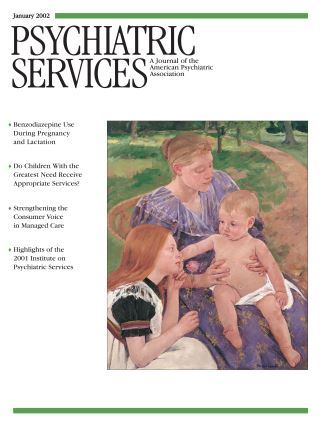Benzodiazepine Risk During Pregnancy and Lactation
Benzodiazepines are frequently prescribed to pregnant women for reducing anxiety and managing preeclampsia or eclampsia in the latter part of pregnancy and to breast-feeding women for treating anxiety disorders and other conditions. In this issue, Mohammad Masud Iqbal, M.D., M.P.H., and his colleagues review three decades of research on the effects of five commonly prescribed benzodiazepines—diazepam, chlordiazepoxide, clonazepam, lorazepam, and alprazolam. They conclude that not enough is known about any of these medications to determine whether their potential benefits to the mother outweigh the risks to the fetus or the nursing infant. Physicians should use benzodiazepines that have long safety records and should prescribe a benzodiazepine as monotherapy at the lowest possible effective dosage for the shortest possible duration (see page 39).
Predicting Incarceration of Mentally Ill Offenders
Probation and parole requirements for mentally ill offenders frequently include compliance with psychiatric medication regimens and other treatment. Individuals can be reincarcerated for a violation of these and other conditions of probation or parole—a technical violation—or for a new criminal offense. Phyllis Solomon, Ph.D., and associates monitored 250 clients of an urban psychiatric probation and parole service for one year to determine what factors predicted reincarceration. Eighty-five individuals were incarcerated during the study period—41 for a technical violation and 44 for a new offense. Although participation in mental health treatment and motivation to participate were associated with a lower risk of incarceration for a technical violation, intensive monitoring of clients by mental health providers were significant risk factors for incarceration for a technical violation. Clients who were incarcerated for a technical violation were more than six times as likely to have received case management services (see page 50).
Is the Psychiatrist Responsible When a Patient Commits Murder?
In this month's Law & Psychiatry column, Paul S. Appelbaum, M.D., provides an account of an alarming legal case in which a law student convicted of murder sued his psychiatrist for failing to prevent the crime and was awarded $500,000 in damages for the trauma he had suffered. The verdict was later thrown out by a court of appeals. Dr. Appelbaum notes that considerable caution must be exercised in drawing conclusions from a jury decision that appears so anomalous; however, he uses some aspects of the case to illustrate the need for clinicians to take prudent approaches to follow-up care (see page 27).
Work Rehabilitation and Substance Use
Substance use and abuse have been widely recognized as a common problem among persons with schizophrenia. Morris Bell, Ph.D., and his coauthors examined substance use among 220 patients in a work rehabilitation program to determine whether it adversely affected performance or whether participation in the program helped patients reduce substance use. They found that 80 percent of the participants met criteria for lifetime substance use but that 75 percent were abstinent when they entered the program. During a 12-month follow-up, abstinence rates remained above 66 percent. Participants with a history of cocaine use were more likely to return to substance use. However, no significant relationships were found between lifetime or current substance use and participation in work rehabilitation (see page 63).
Gender Differences Among Juvenile Arrestees
Julia Yun Soo Kim, Ph.D., and Michael Fendrich, Ph.D., examined data from interviews with more than 4,600 juvenile arrestees nationwide to determine whether girls and boys differed in their drug use, self-reported dependence, and perceived need for treatment. They found that the girls in the sample were significantly more likely than the boys to report severe or chronic drug use, polydrug use, and dependence on drugs. Boys were more likely to report current frequent use. Overall, girls were no more likely to report a need for treatment. However, among those with severe drug problems, girls acknowledged more readily that they needed help. The authors emphasize the importance of considering gender differences in designing juvenile justice treatment programs and in engaging juvenile arrestees in treatment (see page 70).
Briefly Noted…
• The 53rd annual Institute on Psychiatric Services was held in Orlando, Florida, just one month after the terrorist attacks in September. A special report describes participants' responses to those events and highlights some of the scheduled sessions (see page 32).
• The Managed Care column presents the third installment in a series describing strategies for strengthening the consumer voice in managed care (see page 23).

